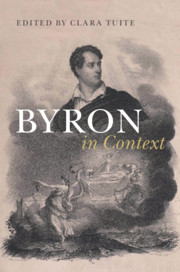Book contents
- Byron in Context
- Byron in Context
- Copyright page
- Dedication
- Contents
- Illustrations
- Contributors
- Chronology
- Abbreviations and Note on the Text
- Introduction
- Part I Life and Works
- Part II Political, Social and Intellectual Transformations
- Part III Literary Cultures
- Chapter 17 Classicism and Neoclassicism
- Chapter 18 Epic (and Historiography)
- Chapter 19 Romance
- Chapter 20 Byron’s Lyric Practice
- Chapter 21 Satire
- Chapter 22 The Satanic School
- Chapter 23 The Lake Poets
- Chapter 24 Byron’s Accidental Muse
- Chapter 25 “Benign Ceruleans of the Second Sex!”
- Chapter 26 The Pisan Circle and the Cockney School
- Chapter 27 Drama and Theater
- Chapter 28 Autobiography
- Chapter 29 “Literatoor” and Literary Theory
- Chapter 30 Periodical Culture, the Literary Review and the Mass Media
- Part IV Reception and Afterlives
- Further Reading
- Index
Chapter 30 - Periodical Culture, the Literary Review and the Mass Media
from Part III - Literary Cultures
Published online by Cambridge University Press: 04 October 2019
- Byron in Context
- Byron in Context
- Copyright page
- Dedication
- Contents
- Illustrations
- Contributors
- Chronology
- Abbreviations and Note on the Text
- Introduction
- Part I Life and Works
- Part II Political, Social and Intellectual Transformations
- Part III Literary Cultures
- Chapter 17 Classicism and Neoclassicism
- Chapter 18 Epic (and Historiography)
- Chapter 19 Romance
- Chapter 20 Byron’s Lyric Practice
- Chapter 21 Satire
- Chapter 22 The Satanic School
- Chapter 23 The Lake Poets
- Chapter 24 Byron’s Accidental Muse
- Chapter 25 “Benign Ceruleans of the Second Sex!”
- Chapter 26 The Pisan Circle and the Cockney School
- Chapter 27 Drama and Theater
- Chapter 28 Autobiography
- Chapter 29 “Literatoor” and Literary Theory
- Chapter 30 Periodical Culture, the Literary Review and the Mass Media
- Part IV Reception and Afterlives
- Further Reading
- Index
Summary
Byron’s career as a poet was bound up with the periodical reviews from the start. Beginning with the publication of English Bards and Scotch Reviewers in 1809 – and, even earlier, with the hostile review of Hours of Idleness in the Edinburgh Review that prompted it – Byron’s identity as a poet was distinctly public – and public in a new way. In one sense, this goes without saying: Byron was famous, and famously so. In another sense, however, the public nature of Byron’s career – and its close proximity to the developing culture of reviewing – has been difficult to see. Despite the long-standing critical interest in early nineteenth-century reviewing, we have only recently begun to appreciate the extent to which Romantic literature and periodical reviewing were reciprocal activities. Considering Byron’s career in the context of the literary reviews and the emerging mass media discloses the sense in which the periodical culture of reviewing was transforming literary production in the Romantic period. Byron’s poetry makes it dramatically clear that the literary world into which the new poet sought to introduce himself in the early nineteenth century was one that was in the process of being remade by the interconnection of poetry and the reviews.
- Type
- Chapter
- Information
- Byron in Context , pp. 246 - 254Publisher: Cambridge University PressPrint publication year: 2019



